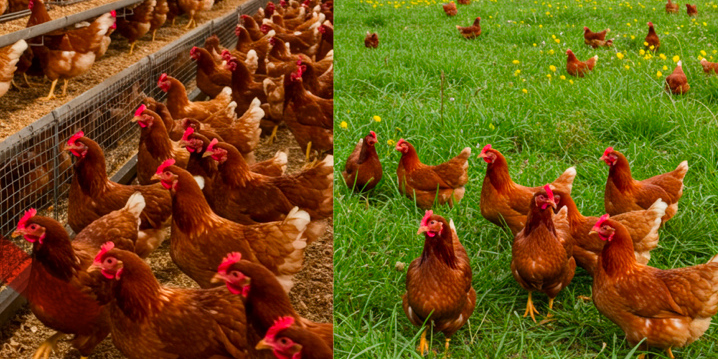When it comes to choosing healthier, more ethical meat, many consumers face the choice between organic and pasture-raised options. While both labels may sound like healthier choices compared to conventional meats, there are important differences that can impact taste, nutrition, and overall quality.
What Does "Organic" Really Mean?
Organic is a regulated certification that sets specific guidelines for how animals are raised and what they are fed. Organic livestock must be:
- Given only organic feed, which means no synthetic pesticides, herbicides, or genetically modified organisms (GMOs).
- Raised without antibiotics or synthetic growth hormones.
- Provided "access to the outdoors" (but this doesn't mean they actually spend much time outside).
While these rules sound great on paper, they don’t necessarily mean the animals are raised in the best conditions. Many organic meats come from large-scale farms that meet only the minimum outdoor access requirements. This could mean animals are confined in crowded barns with a small outdoor area they rarely use.
Why Small Family Farms Often Can’t Afford Organic Certification
Organic certification is a costly and bureaucratic process. The fees alone can run into thousands of dollars per year, and the paperwork requirements are extensive. This makes it difficult for small farms—who are already raising their animals with high ethical and environmental standards—to afford certification.
At Hoffmann Farms, we focus on real farming practices, not just labels. Our animals are raised the right way, out on pasture, with plenty of space and fresh air. While we’re not "certified organic," we go beyond organic by prioritizing animal welfare, environmental stewardship, and exceptional meat quality.
Why Pasture-Raised Meat Costs More (But Is Worth It!)
One of the biggest questions we hear is, "Why is pasture-raised meat more expensive?" The answer comes down to scale and quality. Unlike factory farms that raise thousands of animals in confined spaces, small family farms raise animals naturally, which takes more time, space, and labor.
Here’s what you’re paying for when you choose pasture-raised meat:
✅ More humane treatment of animals
✅ Healthier meat with superior nutrition
✅ Support for local farmers instead of factory farms
✅ No cutting corners on quality
At Hoffmann Farms, we work hard to keep our prices as low as possible while maintaining top-quality standards. In fact, our prices are often comparable to Whole Foods—but with even better quality, freshness, and transparency in how our animals are raised.
Final Thoughts: Choose Quality Over Labels
While organic is a regulated term, it doesn't always mean the best farming practices. Pasture-raised meats from small farms like ours go beyond organic in terms of animal welfare, nutrition, and sustainability. By choosing pasture-raised, you're not just buying meat—you’re supporting better farming, better food, and a better future.

